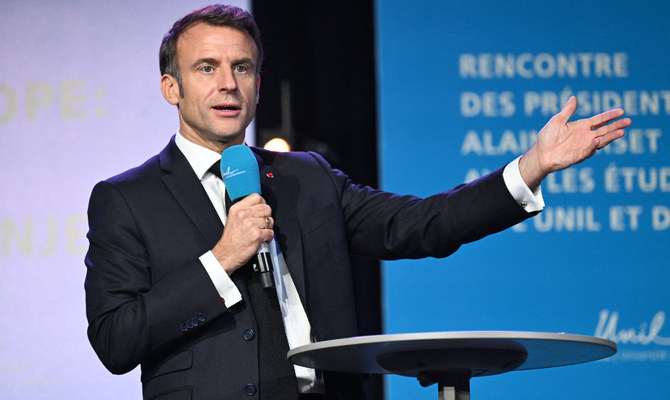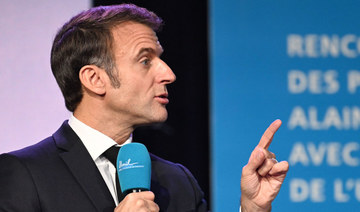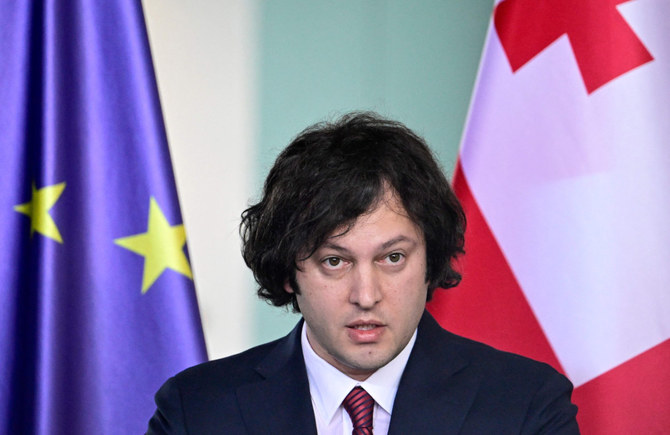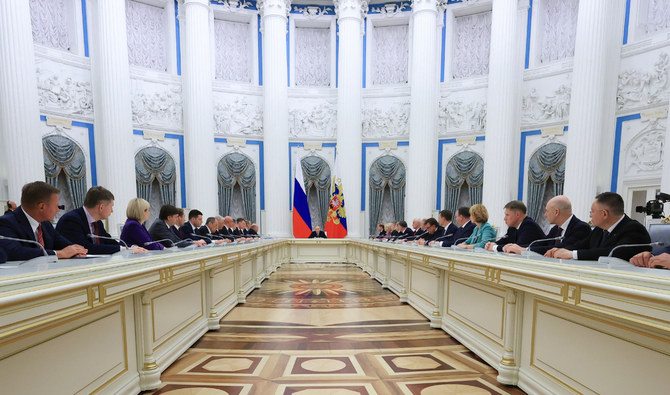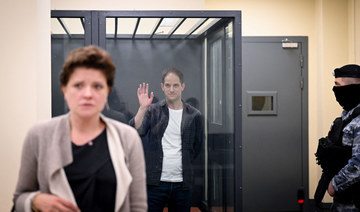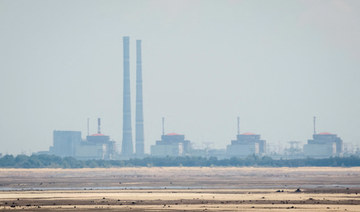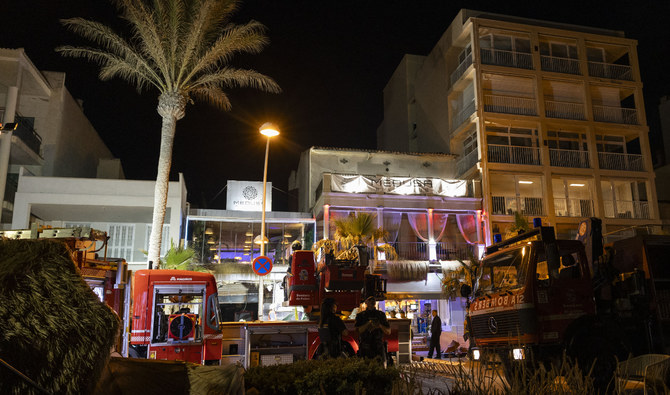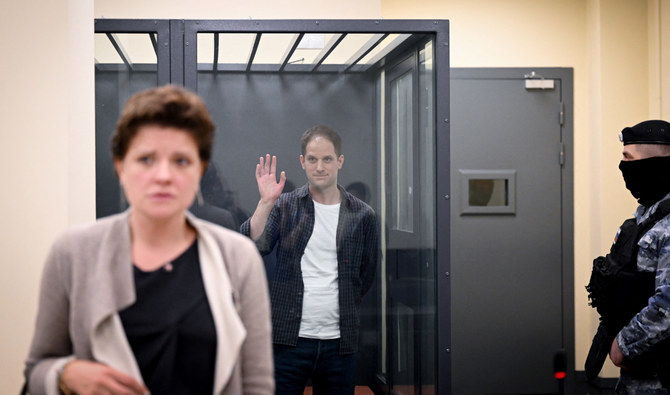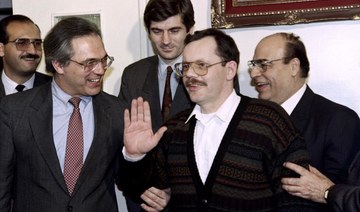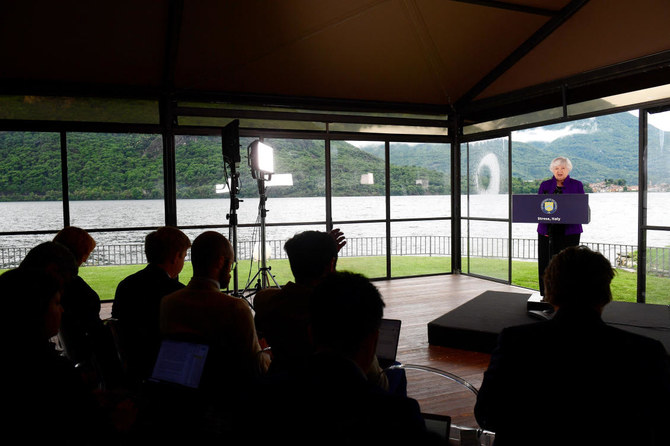RIYADH: French President Emmanuel Macron reaffirmed France’s support for a two-state solution supporting the “legitimate aspirations of the Palestinian people” and “Israel’s right to live in peace” during a press conference in Bern.
During his state visit to Switzerland, Macron was questioned by a journalist on growing concerns over the Israel-Hamas conflict as well as France’s position on the situation at Al-Shifa hospital and antisemitism in France.
“There will never be security for Israel unless there is a political outlet for Palestinian action,” Macron stated.
“This is the position which France has always defended, the position that President (Francois) Mitterrand defended at the Knesset in 1982, and the position I have defended in recent years, including when others sometimes changed their position, changed the capital that they recognized for Israel or abandoned the two-state solution. We have never given in to such calls, never.
“I believe that our response is complete, in line with France’s tradition, and is a universalist and humanist position, seeking to defend the stability, security, and a certain way of life in the Middle East region, and which preserves the unity of our country,” he added.
In response to the journalist’s phrasing of the question, the French president called for a balanced position in the conflict.
“France’s position is clear. It is clear because it is rooted in our history, the French tradition of our historical commitment to Israel and to never compromise on Israel’s right to live in peace and security in the region.
“France has also always supported the legitimate aspirations of the Palestinian people and will continue to work towards a two-state solution,” Macron added.
When questioned about France’s stance on the situation at Al-Shifa Hospital, Macron stated: “We condemn all bombardment of civilians in the strongest terms, and particularly civilian infrastructure that must be protected under international law and humanitarian law. Not only buildings but also the people caring for patients there.
“I should recall that dozens of humanitarian personnel have been killed since the beginning of the bombardment, including international civil servants. That is another reason this position is totally legitimate,” Macron said.
According to AFP, hundreds of people fled on foot Saturday after the Israeli military ordered the evacuation of Gaza’s main hospital where more than 2,000 patients, medics, and displaced people were trapped.
On Sunday the Palestinian Red Crescent evacuated 31 premature babies from Al-Shifa Hospital.
Macron said: “We utterly condemn Hamas’s terrorist attack on Israel. We fully recognize Israel’s right to defend itself and combat terrorism.
“France does not have double standards. I have also repeated that many times and can say it again today,” he stressed.
“It was because of this that when I traveled to the region, we proposed a peace and security initiative for everyone. Since then, we have had a very clear and comprehensive initiative.”
Macron listed the pillars of the peace and security initiative which include combatting terrorism, supporting humanitarian efforts, and the resumption of political work towards a solution.
“Fighting the financing of Hamas, fighting the financing of neighboring terrorist groups, structuring regional and international work against terrorist groups which can threaten the security of Israel and consequently our own security in the region. And doing so on the basis of existing coalitions”
The second pillar is the humanitarian efforts affirmed by the humanitarian conference on Nov. 9 in Paris, “which brought together many countries and raised €1 billion ($1.093 billion) for the UN agency UNRWA on the ground — some €1.2 million in needs were identified, leading to a call for a humanitarian truce which was to lead to a ceasefire which we supported,” Macron said.
The French president laid out the third pillar of the peace and security initiative, stating: “We want this political work to resume immediately because this is the only way to provide an outlet for the Palestinian issue and which, in a way, will prevent too many citizens from neighboring countries, who support the Palestinian issue, from thinking that since there is no political solution, violence could gain some legitimacy.”
Macron stressed: “Violence has never held any legitimacy, and political channels exist. That is France’s position. It is the same as always. It is true that depending on each situation and audience, the emphasis is placed on different points.”
The French president said that, at his request, the French minister for the Armed Forces is visiting the region, following the visit by the minister for Europe and foreign affairs.
“In light of the crisis, it is important to remain in contact with all governments in the region, to explain our position to them, enhance cooperation and provide them with concrete assistance in all areas.”
Macron said France’s priority today is “to join the call to free all hostages, but naturally, French or binational hostages in particular who are currently being held by Hamas.
“Their release must be unconditional,” he added.
Macron explained that the topic is currently under discussion, which has led to further exchanges with members of the government and the Israeli president, as well as with the emir of Qatar and several other regional leaders.
The president extended his gratitude to “all friendly nations which are assisting with these negotiations, particularly Qatar.”
Macron said that France is “working tirelessly to free our hostages so that they can return to their loved ones.”
During the press conference, the French president was asked about the rise in antisemitic acts in France and his decision to not take part in the march against antisemitism on Nov. 13.
“It is not the role of a president to attend a march,” he said, adding: “The last time one of my predecessors attended a march, it was the day after a terrorist attack, alongside 2 million people and dozens of heads of state and government in the streets of Paris.”
Macron stated that he welcomed the march, however, and supported its call.
“My role is to work to help obtain the release of our hostages, which I have done by calling political leaders who are helping me to do so in Israel and in Qatar, and my role is to continue preserving the unity of the country at this time, and never to foster division.”
Macron reaffirmed France’s position, which was announced on television on Oct. 12 following a rise in the number of antisemitic acts in France after the Oct. 7 Hamas attack and subsequent Israeli military activity. He said antisemitism was a forerunner of other forms of hate, and stressed the need for unity to prevent any spillover of the Israeli-Palestinian conflict.


